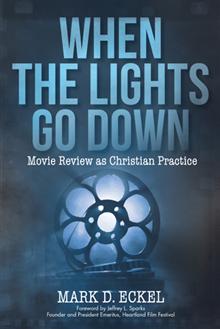

We love stories, tell stories, and read stories, knowing that stories can only be told because the story exists.
Reflection
A good year at the movies can be gauged by two standards, according to Lisa Schwarzbaum in Entertainment Weekly:[i] “How often were we surprised by storytelling that feels fresh, energized, funny, deep? And how often were we satisfied even by stories as familiar as one about a cop and his partner, a spy and his nemesis, a princess and her mother?”
Lisa Schwarzbaum has it right: storytelling surprises and satisfies us. Stories capture our attention. Stories take us places we have not been before. Stories are full of emotion, drama, discovery, and often, unexpected endings. Emotion in stories makes us feel something. The elements of stories in movies are the elements of life.
God communicates His story—“the larger story”—in stories. In fact, the Christian narrative runs from “once upon a time” to “happily ever after.” The Bible is the origin of all epic tales from the past. Stories have the same elements as God’s first story:
- good/evil
- lost/found
- road/destination
- despair/hope
- acceptance/rejection
- beginning/end
God’s story originates as supernatural revelation.
Supernatural Revelation: God uses miracles (Ex 6-12; 2 Kgs 5) and the attraction of believers (Ruth 1:16, 17; 1 Kgs 10:1-9) to demonstrate truth to unbelievers. But of course, the written Word of God (Scripture) and the living word of God (Jesus) are the primary means by which God helps his people to view the world (Ps 119; Jn 1:1-18).
God’s Story depends on natural revelation to communicate the supernatural revelation.
Natural Revelation: God has called all people to Him through the witness of creation (Job 12:7-10; Ps 19, 104; Rom 1:18-32), conscience (Rom 2:14-15), and human law (1 Tim 1:8-11). Although marred by corruption, God made “everything in creation” good (1 Tim 4:1-6). Regenerative thinking (Rom 8:6-9; 12:2) makes reclamation of creation possible.
God’s supernatural storyline drives every natural storyline in film, one way or another. God’s story—and every good movie story—has three essential components:
- Imagination
- Inspiration
- Invitation
Imagination drives our feelings. Just like great literature, great movies move us emotionally.
Losing a loved one moves us in Francis Ford Coppola’s The Rainmaker. A lawyer takes a large insurance company to task; a child died because the company found loopholes in order not to pay. John Grisham’s best-selling novel brought to screen is an unforgettable, emotionally driven drama. We can imagine that this very scenario could happen to us. Movie imagination drives home truth through emotion.
Imagination in movies uses our emotion to inspire us. Our participation is exhorted. For instance, we may be made to feel “That’s not right!” and do something about it. Brooklyn Dodgers general manager Branch Rickey was that man for us. Rickey knew that the first black player in Major League Baseball was going to endure racist rants. The cigar-chomping, Bible-thumping Rickey needed someone who could turn the other cheek, as well as turn a double play. He turned to Jackie Robinson. Brian Helgeland’s 42 is the movie inspired by the true story. We leave the theater thinking, I want to be just like that.
Inspiration then sends an invitation. Hospitality, a welcome home, comes in many forms. We are encouraged to invite friendship, shown through one of the best bonding/buddy movies of all time, Rob Reiner’s Stand by Me. We are invited into a family, even though family does not always look like what we expect in Toy Story 3. The Place Beyond the Pines asks how much influence family has in a life. Redemption invites us to find redemption for ourselves by redeeming others. Cinderella Man extends the invitation through a question, “What sacrifices are we willing to make for the future of our families?”

Every story, every movie is an invitation driven by inspiration, delivered through our imagination. Peter Jackson connects the larger story—God’s story—with J. R. R. Tolkien’s story. Lord of the Rings: The Two Towers calls us to action.
“Those were the stories that stayed with you ’ folk in those stories had lots of chances of turning back, but they didn’t. ’ They kept going because they were holding on to something.”
“What were they holding on to, Sam?”
“That there’s some good in the world and it’s worth fighting for.”
We find ourselves in the middle of God’s story, knowing what is worth fighting for. The fight is worth it because we know there is a beginning and an end. God’s story, the foundation for all stories, all movies, is the Christian narrative moving us from “once upon a time” to “happily ever after.”
Schwarzbaum is right. Movies, like all good stories, surprise and satisfy because they tell us about another world. No matter what books we read or movies we watch, the stories point up, to the author of all things.
Questions
- In a movie is our imagination engaged, exercised, and corralled by Christian thought?
- Is the movie’s nature of reality or make believe informed by a Christian viewpoint?
- Are viewers of a movie led to a great understanding of their culture and their world?
- Are cultures seen in a film seen as morally equal or morally ambiguous?
- Do any societal boundaries exist in the movie?
- Is cultural expression guided by transcendent truth, individual choice, or a particular communities’ values?
Prayer
Dear Lord. May Your Story be our story, may we continue to tell Your Story to others, and may the stories we see in movies be always passed through the grid of Your Story. Amen.
Resource

Mark D. Eckel. When the Lights Go Down: Movie Review as Christian Practice. (Westbow, 2014).
[i] Lisa Schwarzbaum, “This Was the Year That … Movies Got Great Again,” Entertainment Weekly, Issue #1239-1240 (Dec 28, 2012).
Editor’s note: The second piece in a five part movies series. If you’d enjoy the opportunity to write a review of a movie’s portrayal of higher education, interaction with an important topic with which you are familiar due to your studies/research, and/or value to your campus fellowship (due to a movie night, discussion group, etc.), please drop Thomas B. Grosh IV (Associate Director of the Emerging Scholars Network) a note. He’s very interested in hearing from you this summer 🙂
Dr. Mark Eckel is adjunct professor for various institutions, President of The Comenius Institute (website), spends time with Christian young people in public university (1 minute video), hosts a weekly radio program with diverse groups of guests (1 minute video), interprets culture from a Christian vantage point (1 minute video), teaches weekly at his church (video) and writes weekly at his website warpandwoof.org.

Mark – with the LOTR reference I am reminded that great stories do not always end with “happily ever after,” or at least not completely. As much as Frodo is the hero, he is permanently scarred by his journey with evil. Tolkien seems like he wants to remind us that no one escapes the “wraithing” quality of sin. The end cannot be had without pain and loss – the wages of sin is death after all.
And one of my favorite parts about the story is that the grand story is driven by the little goods in which we all participate – family, good friends, good food and drink, and a pipe full of Longbottom leaf.
Thanks for the reminder of a great story.